What Size Van Do I Need To Hire?
Use our quick and easy guide to decide what size of van you need to hire. It's important to get this right -- hiring a van that's too big or too small can be costly and inconvenient.
CLICK A VAN FOR FULL DIMENSIONS
Van hire companies often indicate the load capacity of their vans in cubic metres . For most people, this isn't very helpful, so we have provided the approximate length, width and height of each van's load compartment instead.
We've also included typical payload (load weight) and fuel economy figures for each type of van - while these vary, our figures cover most vans and will give you an idea of what to expect. If you have a specific payload requirement, make sure you check with your rental company when booking.
For a guide to van jargon, check out our Van Hire Jargon Buster.
Disclaimer: All weights and dimensions provided are typical examples. The available payload and loadspace of specific rental vans will vary and may be outside the range indicated. vanrental.co.uk accepts no liability for any losses suffered if your van is too small or has insufficient payload.
Compact Vans - Ford Transit Courier, Citroen Nemo or similar
 These small vans are a popular choice of hire van for city use due to their compact dimensions. They are smaller than some cars and are very easy to drive and park. They're also very fuel efficient.
These small vans are a popular choice of hire van for city use due to their compact dimensions. They are smaller than some cars and are very easy to drive and park. They're also very fuel efficient.
They seat two (driver + one passenger) and offer a surprising amount of load space in the back. Most standard size washing machines or cookers should fit, or perhaps a chest of drawers or an office chair (or some boxes).
In some models the front passenger seat can be folded down to extend the load space and carry longer items, but don't count on this with rental vans, as not all compact vans have this feature. Similarly, some models have sliding doors at the side and some only have rear doors.
Width: 1.4m
Height: 1.2m
Small Vans - Ford Transit Connect, Vauxhall Combo or similar
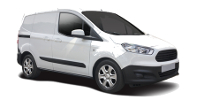 Small vans are similar in size to a family estate car but offer much more space inside. They offer good fuel consumption and are just like cars to drive so they are a popular choice of van to hire.
Small vans are similar in size to a family estate car but offer much more space inside. They offer good fuel consumption and are just like cars to drive so they are a popular choice of van to hire.
Seating is usually restricted to the driver plus one passenger, although some models now have a third seat in the middle. This is usually a bit of a tight squeeze, but can be useful for short journeys.
If you're a student moving your stuff but without any furniture, a small rental van will probably be big enough for your needs (although do check).
Alternatively, this size of van is ideal for one or two kitchen appliances (e.g. washing machine, fridge, cooker) or perhaps some dining table chairs or chests of drawers. Or you could probably fit 8-12 cardboard removal boxes, depending on their size. If you're having a garden clear out, you should be able to fit two or three dumpy bags of garden waste in for trips to the tip.
Width: 1.49m
Height: 1.2m
Medium Vans - Ford Transit Custom, Volkswagen Transporter or similar
 This size of van offers a lot more flexibility and space in terms of load. They are one of the most popular types of vans to hire. A short wheelbase Ford Transit or similar will have a load space of around 2.4m, meaning that eight foot lengths of timber and standard 8x4 sheets of plasterboard will fit comfortably.
This size of van offers a lot more flexibility and space in terms of load. They are one of the most popular types of vans to hire. A short wheelbase Ford Transit or similar will have a load space of around 2.4m, meaning that eight foot lengths of timber and standard 8x4 sheets of plasterboard will fit comfortably.
There's also more headroom, usually a minimum of 1.4m, or more for a high roof model. This means some larger items can be stood upright. Alternatively you should be able to fit several dozen removal boxes, depending on their size and how easily they can be stacked. Remember they need to stay stable and not get crushed.
If you're hiring a van to move furniture, then a medium van may be big enough for dining tables (up to 8ft) and most wardrobes, sideboards and dressers. Mattresses and bed frames should also fit. You'll probably be able to carry two armchairs, or possibly one sofa. But if you need to move sofas, then we suggest checking sizes. Some sofas are very large and a medium van could still be too short.
Width: 1.7m
Height: 1.4m or 1.65m with medium roof
Large Vans - Ford Transit LWB or similar
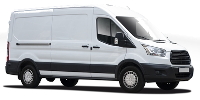 A long wheelbase van is more likely to have a high roof, so you'll get extra height as well as extra length. The load area is usually around 3.5m-4m long on this type of van, meaning that pretty much any item of household furniture should fit. Indeed, you're likely to be able to fit a number of boxes, a couple of sofas and some other items in a van of this size.
A long wheelbase van is more likely to have a high roof, so you'll get extra height as well as extra length. The load area is usually around 3.5m-4m long on this type of van, meaning that pretty much any item of household furniture should fit. Indeed, you're likely to be able to fit a number of boxes, a couple of sofas and some other items in a van of this size.
For a one-bedroom flat move, a long wheelbase van may be big enough. It depends how much furniture and how many white goods you need to move. If you're doing the move yourself, then consider measuring some of your stuff and working out how it might fit in, using the example van sizes on the right of this page.
It's important to remember that not everything can be stacked safely.
Width: 1.7m
Height: 1.7m
Extra Long Vans - Mercedes Sprinter XLWB or similar
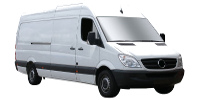 Extra-long vans are popular with couriers and light haulage firms for the incredible amount of space they offer. These vans usually have a high roof and the load area is likely to be 4.5m-5m long. This size of van is also popular with carpet fitters, as entire rolls of carpet can be fitted safely inside.
Extra-long vans are popular with couriers and light haulage firms for the incredible amount of space they offer. These vans usually have a high roof and the load area is likely to be 4.5m-5m long. This size of van is also popular with carpet fitters, as entire rolls of carpet can be fitted safely inside.
For home removals, the main advantage of extra-long vans is the extra space they offer. A van this size should be big enough for a small flat, unless you have a lot of furniture. The extra load length provides more space to fit bulky items of furniture and large appliances along with your removal boxes.
One word of warning - these larger vans can't usually carry any more weight than a smaller long wheelbase model. So if you're transporting something heavy, such as building supplies, you may not be able to use all of the extra space without being over the legal weight limit.
Width: 1.7m
Height: 1.8m
Luton Van
 The most popular type of rental van for small house removals is the Luton. These vans have box bodies which sit above the van's wheels, so they are completely square, without any wheel arches or other intrusions. Luton vans also offer a little extra width compared to a panel van, plus a useful space over the cab where you can store light but bulky objects, such as cushions and bags of clothing.
The most popular type of rental van for small house removals is the Luton. These vans have box bodies which sit above the van's wheels, so they are completely square, without any wheel arches or other intrusions. Luton vans also offer a little extra width compared to a panel van, plus a useful space over the cab where you can store light but bulky objects, such as cushions and bags of clothing.
Luton vans normally have standing height inside and are designed to make it easier to strap large items to the side of the van. For example, you could put a wardrobe in standing upright and strap it to the side of the van so it can't move. Carrying large objects in this way often makes more efficient use of space than is possible in a panel van.
Another advantage of luton vans is that they are often available with tail lifts, so heavy or bulky objects can be raised and lowered without too much lifting. Please note that not all lutons have tail lifts, so please check when you book if this is a requirement.
Width: 2m
Height: 2.2m
Dropside 3.5t Trucks (Single Cab)
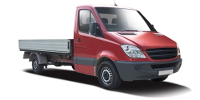 A 3.5t dropside van has a large flat load deck at the back, with folding sides (dropsides) that can be locked into place for transport and then lowered to make it easier to load and unload heavy objects.
A 3.5t dropside van has a large flat load deck at the back, with folding sides (dropsides) that can be locked into place for transport and then lowered to make it easier to load and unload heavy objects.
Another attraction is that the lack of a body helps to provide a generous payload, usually from 1,200kg-1,500kg, compared to perhaps 1,000kg-1,200kg for a large panel van. However, payloads vary widely between models. Check with your hire supplier if this is important to you.
Dropside rental vans are ideal for building materials or garden projects, as they are more suitable for dirty work than panel vans, and are easier to load and unload. They're also good for items that need to be lifted by crane on to the load bed. However, there's no protection from the elements or from thieves, so dropsides are not very well suited for household goods or anything else that's valuable and portable.
Width: 2m
Dropside 3.5t Trucks (Crew Cab)
 If you need the load-lugging practicality of a dropside (see above) but want to carry up to five passengers, then a 3.5t dropside van with a crew cab could be what you need. These offer similar payloads to a standard dropside, although it's worth remembering that the size of the load area may be shorter to compensate for the larger cab.
If you need the load-lugging practicality of a dropside (see above) but want to carry up to five passengers, then a 3.5t dropside van with a crew cab could be what you need. These offer similar payloads to a standard dropside, although it's worth remembering that the size of the load area may be shorter to compensate for the larger cab.
Width: 2m
Tipper (3.5t)
 A 3.5t tipper van is much like a dropside, but with the added addition of tipping gear. In other words, a hydraulic ram underneath the load bed that lifts it up at the front so the contents can be tipped out the back.
A 3.5t tipper van is much like a dropside, but with the added addition of tipping gear. In other words, a hydraulic ram underneath the load bed that lifts it up at the front so the contents can be tipped out the back.
The extra weight of the tipping gear reduces the payload of a tipper slightly when compared to a dropside, but otherwise the two types of van are pretty much interchangeable. Like dropsides, tippers are most popular for building and gardening work. Not all rental companies offer tippers, as they are mostly only hired to trade customers.
Width: 2m
Pickup - Ford Ranger, Mitsubishi L200 or similar
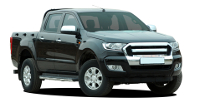 Pickups are classified as light commercial vehicles due to their load carrying area at the back. Most modern pickups can carry at least 1,000kg on the load bed, although as always this does vary.
Pickups are classified as light commercial vehicles due to their load carrying area at the back. Most modern pickups can carry at least 1,000kg on the load bed, although as always this does vary.
These models are increasingly popular and most van hire companies now offer them. For building projects or sites where access is down unsurfaced roads, pickups' four-wheel drive and tough off-road design can be very useful. In some circumstances, they're a lot more suitable than a regular dropside or panel van.
The downside is that load space is very limited compared to a dropside, especially with double cab pickups.Width: 1.5m
(with double cab)
7.5 Tonne Truck
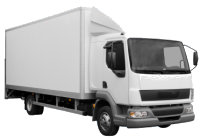 If a luton van isn't big enough for your removals, then the next size up of vehicle is the 7.5 tonne box van. This is smaller than a HGV but significantly bigger than any 3.5t vehicle, as you can see from the example vehicle dimensions we've provided. 7.5t trucks are also able to carry a lot more weight. The payload generally ranges between 2,500kg and 3,000kg, depending on the model of the vehicle and the design of the box body.
If a luton van isn't big enough for your removals, then the next size up of vehicle is the 7.5 tonne box van. This is smaller than a HGV but significantly bigger than any 3.5t vehicle, as you can see from the example vehicle dimensions we've provided. 7.5t trucks are also able to carry a lot more weight. The payload generally ranges between 2,500kg and 3,000kg, depending on the model of the vehicle and the design of the box body.
A 7.5 tonne lorry is likely to be a good choice for a 2-3 bedroom house move, where there's a lot of furniture, kitchen appliances and other possessions.
Driving a 7.5t truck: You need to have category C1 on your driving licence to drive a 7.5 tonne vehicle. If you passed your car driving test before 1 January 1997, then you should have C1 entitlement. If you passed your car test after 1 January 1997, you'll need to have taken a separate C1 test. Note that although you can use a 7.5t vehicle for personal use in the UK without any other restrictions, you can't drive one of these vehicles for any commercial purpose without a valid operator's licence and a tachograph card.
Width: 2.3m
Height: 2.4m-3.4m
Disclaimer: All weights and dimensions provided are typical examples. The available payload and loadspace of specific rental vans will vary and may be outside the range indicated. vanrental.co.uk accepts no liability for any losses suffered if your van is too small or has insufficient payload.










